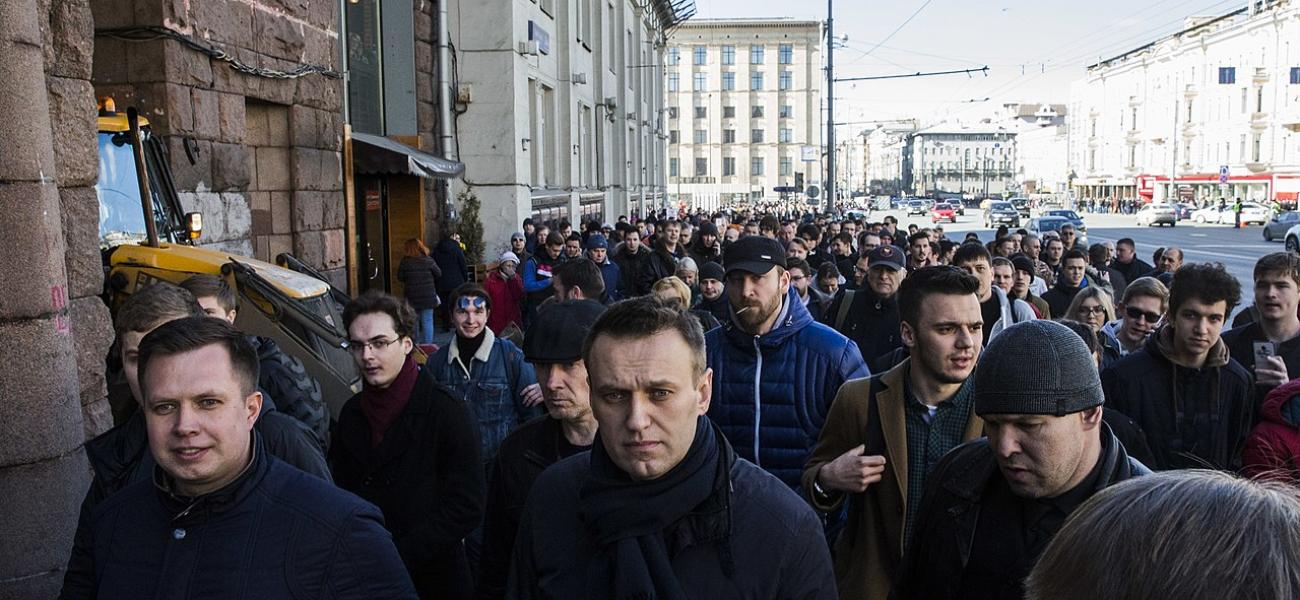
We Need to Have a Talk About Alexei Navalny
This article was originally published by The Washington Post.
Last week, Amnesty International caused a stir by downgrading Russia’s most famous opposition leader. The human rights group decided to rescind the status of “prisoner of conscience” it had previously given to Alexei Navalny, who was sentenced last month to a little over 3 1/2 years in prison by a Russian court.
Amnesty says that it took action because of past comments made by Navalny that “may have amounted to advocacy of hatred that constitutes incitement to discrimination, violence or hostility.” Navalny’s supporters then accused Amnesty of playing into the hands of the Kremlin, which has repeatedly used Navalny’s statements to depict him as a fascist.
I agree that Amnesty’s decision was ill-advised — precisely because anyone who wants to have a frank conversation about Navalny’s past statements can now be easily dismissed as a Kremlin puppet. Many of Navalny’s supporters fear that acknowledging some of the nasty things that he has said over the years will overshadow his efforts to publicize the human rights abuses of the Russian state. They want to avoid the subject altogether.
But that just isn’t an option. If Navalny is serious about challenging the current regime, Russians — and the outside world — have a right to know precisely whom we’re dealing with.
Navalny’s political fame rests primarily on his success as an anti-corruption activist — but he’s also made waves with his strident xenophobia. In one notorious 2007 video, he equates Muslim militants with “cockroaches” that can only be dealt with by exterminating them. In another from 2011, he depicts himself as an unapologetic nationalist who will deport non-White immigrants from Central Asia and the Caucasus by ruthlessly deporting them. There are other examples.
Some well-respected journalists have written nuanced analyses of Navalny’s remarks that help us to understand his rise in Russian politics. It’s true that the videos I’ve cited above are old — but he’s been strikingly consistent in his refusal to disavow them. (He did take back one comment he made back at the time of the Russo-Georgian war in 2008 when he described Georgians using a racist epithet.) I’ve heard some defenders claim that he has “softened” his tone or assert that some people in the southern regions of the former USSR have rallied for him — as if that absolves him from his disgraceful language.
Navalny could easily resolve matters by taking a clear stand. But as recently as December, in an interview with economist Sergei Guriev, he has instead tried to fudge the issue. He also dodged it in this 2019 interview with the Financial Times — in which he repeatedly and gratuitously uses a Russian slur for gay people.
I understand why many are reluctant to engage Navalny’s racist statements. He’s widely and rightly viewed as the main symbol of resistance to Putin’s corrupt and oppressive regime — and it is not a fair fight. Navalny is largely on his own against the massive resources of the Russian state, which has tried to silence him with massive disinformation campaigns, prison terms, and at least one attempt on his life. I get it. I, too, support and admire his bravery. If he’s one day able to find his way to power and transform the way the country is run, his life could potentially have an even wider impact beyond the borders of Russia.
Yet, one key element of a person of conscience is his or her capacity to self-reflect. All Navalny has to do — presumably, once he’s out of prison, with full control over his own statements — is to apologize clearly for his past statements and explain, in intricate detail, how he has moved on from them. Apologizing not only empowers him to encourage his own supporters to fight racism in Russia. It will also help to defend him against bad-faith actors like Putin’s regime, which cares nothing about racism, and clearly only wants to use the issue opportunistically against its enemies.
A person’s past mistakes or ignorance should never permanently define them. But the stubborn refusal to address them in a meaningful way causes problems of its own. At some point, Navalny has to decide if he wants to set a better example or prefers to follow the path of those Russian liberal elites who ignore racism in their own country.
If Navalny and his supporters would look past the Kremlin trolls and genuinely consider why others find his stance on race unclear, they’d surely get more new voices on their side to help them fight Kremlin disinformation. I’d be happy to be one of them. Calls for Navalny to settle once and for all his position on race aren’t designed to distract from his anti-corruption efforts. Instead, they are designed to push him into being a better leader.
Amnesty International has since said they’re reviewing their decision. If I were them, I’d reinstate his status. I take racism very seriously. But this was not the right time or place for Amnesty to take its action. Instead of standing on principle, they have made the job of addressing Navalny’s past statements much harder.
Terrell Jermaine Starr
Terrell Jermaine Starr is a nonresident senior fellow at the Atlantic Council’s Eurasia Center and a senior reporter at The Root, where he writes about race in America.
Photo by Evgeny Feldman shared under a Creative Commons license. The opinions expressed herein are solely those of the author.
